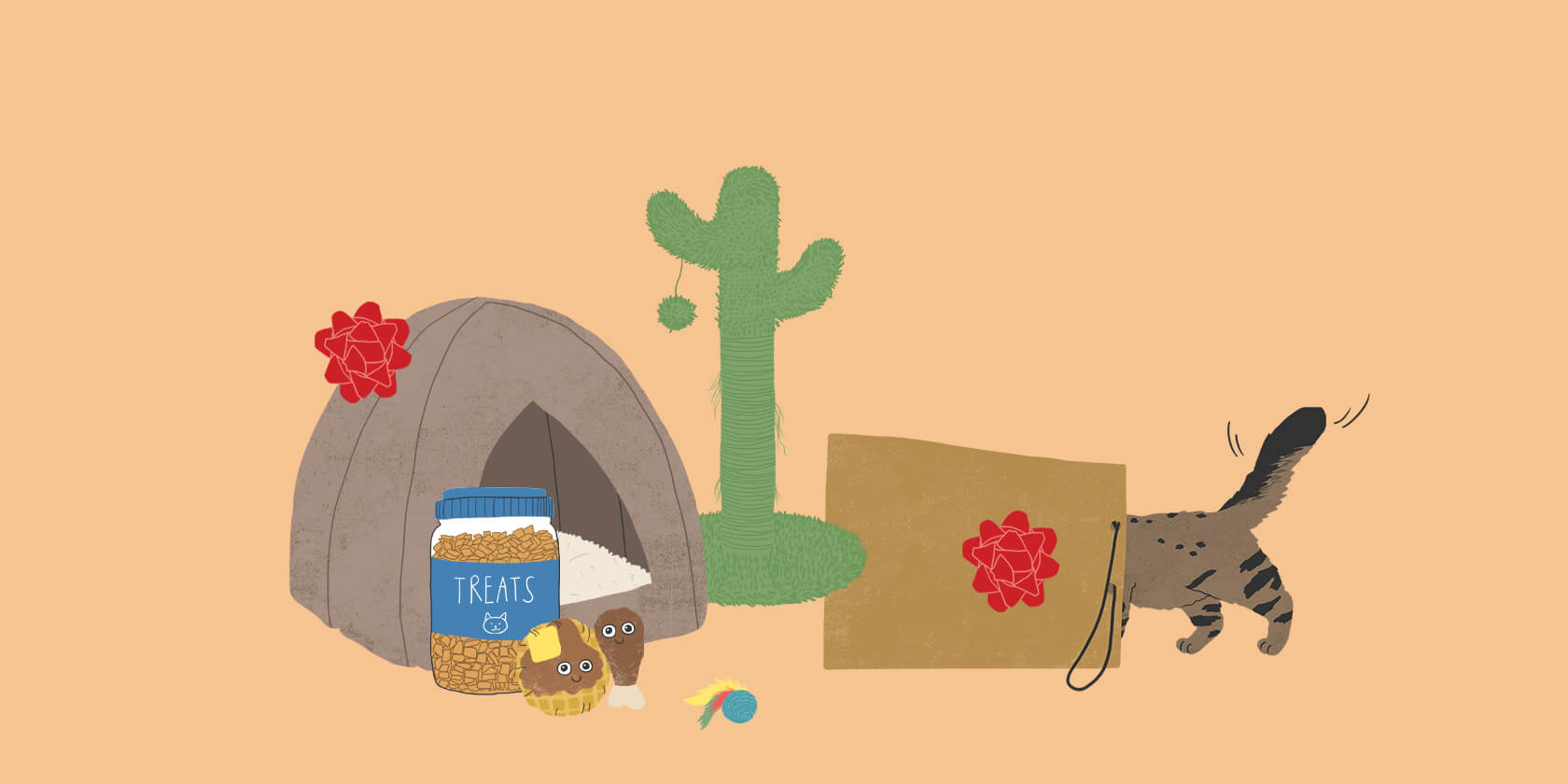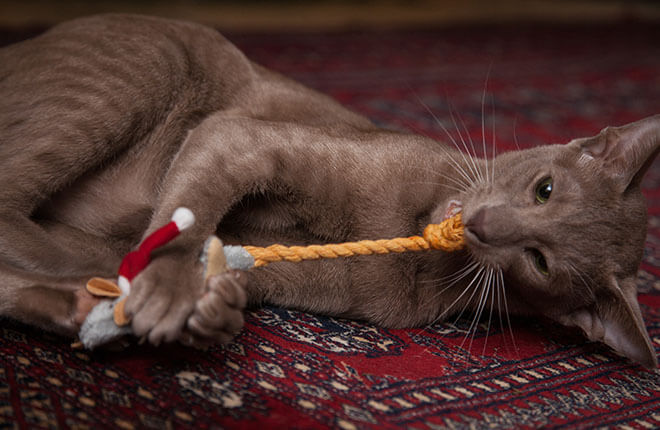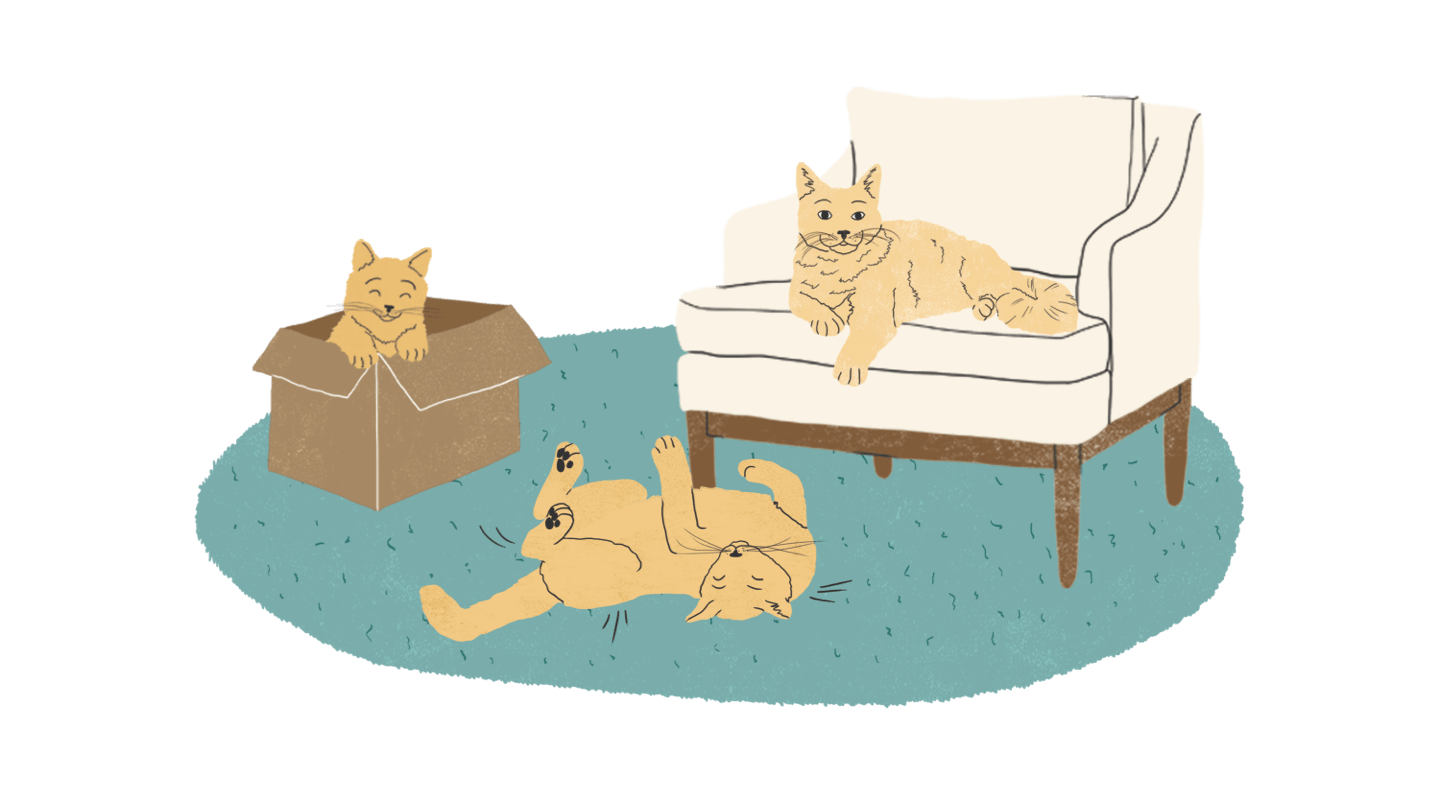Cats are naturally curious creatures. This makes giving them gifts not only a joy for our feline friends, but for us too. Remember the pleasure you felt the first time you presented your cat with a battery-operated toy, like a robotic mouse? The movement sparked their interest, first drawing an intense stare, followed by a tentative pat of their paw. Then it was off to the races as they darted after their "prey" and pounced on it.
This is why we love giving our cats gifts for Christmas, Hanukkah, birthdays, adoption days, and everything in between.

What to Consider When Shopping for Gifts for Your Cat
- What do they like? Consider their personality. You may think a Santa hat would be an adorable Christmas gift, but they may disagree.
- How will it benefit them? Like all animals, enrichment is important for cats. It provides environmental stimuli necessary for optimal physical and emotional well-being. Quite simply, it allows cats to express their natural, instinctual behaviors and have fun doing it.
- Is it safe? It's important to make sure any gifts you buy or make for your cat use pet-safe materials and don't include anything they could ingest or injure themselves on.
Cat Gifts for Environmental Enrichment
When considering gifts to promote environmental enrichment, consider all your cat's senses.
- Window perches. These allow your cat to watch nature's activities outside. Make it even more interesting by providing a bird feeder or birdbath they can see from the window.
- Elevated spaces or a cat tree. This provides your feline friend a spot where they can get a different perspective of their surroundings and serves your cat’s climbing needs.
- Cat condos with covered sides. Also referred to as cat castles or cat caves, these enclosures provide visual security that makes for a peaceful retreat when they want to relax. This doesn't have to be fancy. There are some creative DIY ideas using cardboard boxes.
- A catio. A catio is an outdoor enclosure that provides your cat with safe outdoor time. It tickles all the senses: a front-row view of outdoor activities, the chirping of birds, the smells of nature, and the feel of grass on the paw pads.
- Catnip. This is the most common type of scent enrichment for felines. Catnip elicits an almost Zen-like euphoria in most cats.
- Food treats. Food treats are a great reward for a job well done, like teaching your cat tricks or rewarding behavior you want to encourage. Buy them or make your own.
- Cat grass. Safe for cats when they chew and ingest it, cat grass is also a great way to preserve the leaves of the other plants in the house.
- Cat drinking fountain (circulating water filtration system). The constantly flowing water piques a cat's interest and will help keep them well hydrated by encouraging drinking.
- Scratching posts and pads. Not only will these enhance your cat's sense of touch, but they also provide appropriate indoor scratching surfaces for them to express their natural need to scratch. To save your furniture, provide plenty of choices in different locations.
- Cat beds. With numerous types and styles available on the market, you are sure to find one that provides luxurious lounging for your catnapper.
Cat Gifts for Social Enrichment
Social enrichment for cats often comes in the form of play and interaction. Gift your cat something new and exciting this year.
- Interactive toys. Wand-type toys with strings, feathers, and fabric strips are a great way to engage with your cat, sharing fun and positive experiences that strengthen your bond. If a laser pointer is used, make sure you end the play session by having your cat "catch" something physical, like a stuffed toy. This prevents the buildup of frustration that can occur when a cat cannot "capture" the laser light.
- Battery-operated toys. For cats who love the chase, toys like robotic mice draw out their predatory instincts since they mimic the movements of real-life rodents, providing plenty of entertainment while your cat is alone.
- Brushes for grooming. Most cats enjoy being brushed and groomed. It's a way of building trust and showing your cat affection, not to mention decreasing shedding and hairballs.
- Play tunnel. Perfect for cats who like to get into things, a play tunnel is excellent for exploring, playing hide-and-seek, and even taking a nap.
- Low-cost (or no-cost) items. Often a cat's preferred toys are items that cost very little or nothing at all. Empty cardboard boxes and large paper bags (with the handles removed for safety) often capture the interest of cats better than the most expensive cat toys on the market.
Cat Gifts for Cognitive Enrichment
Providing opportunities for cats to use their cognitive skills for problem-solving is another important area of enrichment and opens up many fun gift ideas.
- Food puzzles. They help satisfy a cat's instinct to search for food. The puzzle is filled up with a favored food or treat, and the cat learns to manipulate the puzzle to release the food.
- A clicker. Contrary to popular belief, cats can be taught how to do tricks. Clicker training is a great method for this training, especially for more complicated tricks, like rolling over. Not only does it provide great mental stimulation and cognitive enrichment for cats, but it is also another way to engage with your feline companion in a fun and positive way. Cats can be taught to respond to any number of cues, like "sit," "down," and "high five," using food treats as a reward.
Giving gifts to our feline companions is a great way to reaffirm our connection with them and have fun doing it!
ZPC-01455R1



